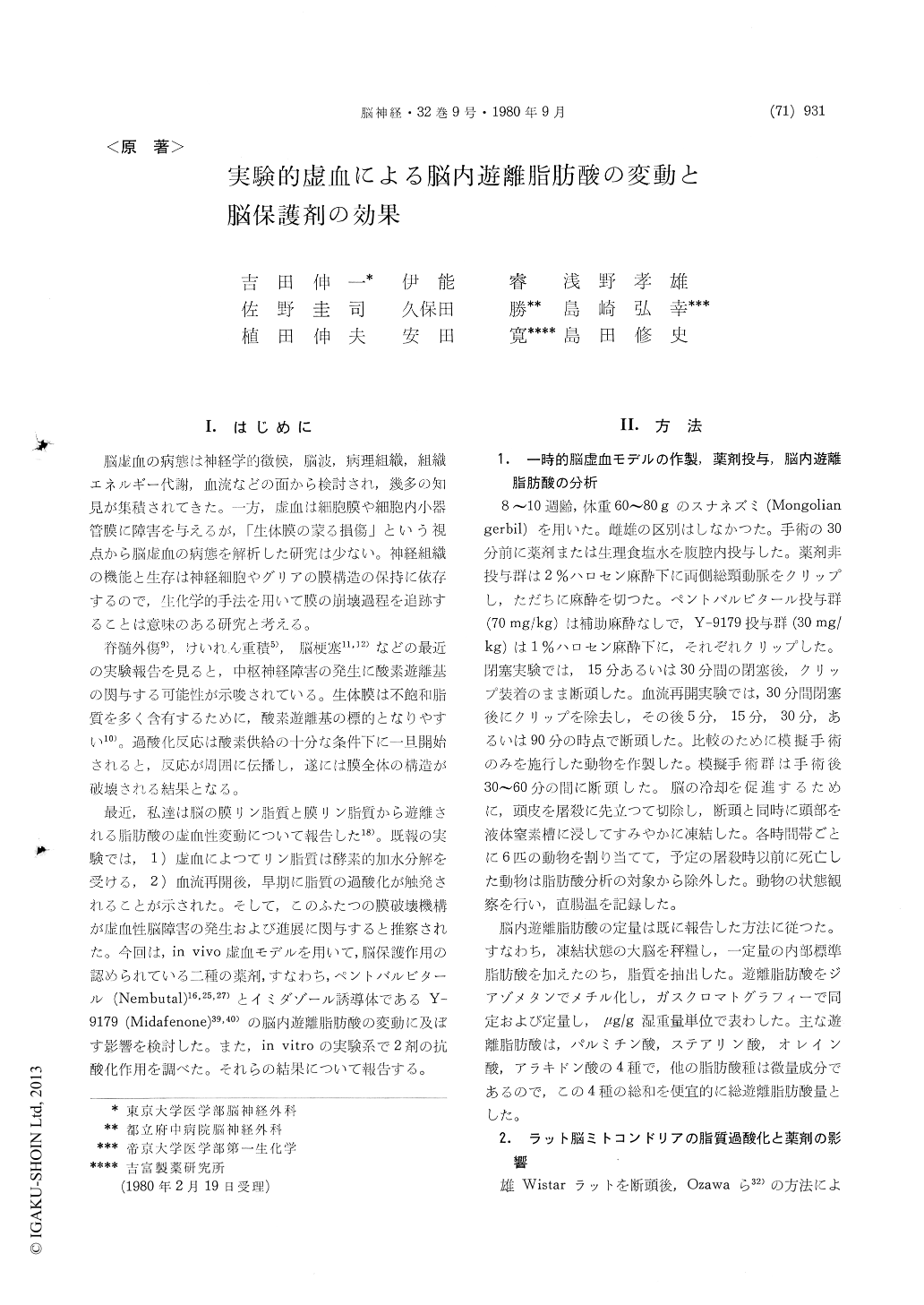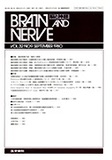Japanese
English
- 有料閲覧
- Abstract 文献概要
- 1ページ目 Look Inside
I.はじめに
脳虚血の病態は神経学的徴候,脳波,病理組織,組織エネルギー代謝,血流などの面から検討され,幾多の知見が集積されてきた。一方,虚血は細胞膜や細胞内小器管膜に障害を与えるが,「生体膜の蒙る損傷」という視点から脳虚血の病態を解析した研究は少ない。神経組織の機能と生存は神経細胞やグリアの膜構造の保持に依存するので,生化学的手法を用いて膜の崩壊過程を追跡することは意味のある研究と考える。
脊髄外傷9),けいれん重積5),脳梗塞11,12)などの最の実験報告を見ると,中枢神経障害の発生に酸素遊離基の関与する可能性が示唆されている。生体膜は不飽和脂質を多く含有するたに,酸素遊離基の標的となりやすい10)。過酸化反応は酸素供給の十分な条件下に一旦開始されると,反応が周囲に伝播し,遂には膜全体の構造が破壊される結果となる。
We have recently reported on ischemia-induced changes in cerebral phospholipids and free fatty acids (FFAs). Two mechanisms, i. e. enzymatic hydrolysis of phospholipids and post-ischemic lipid peroxidation, were proposed to be involved in the damaging processes of biomembranes. The present study was undertaken to examine the effects of pentobarbital and Y-9179 (Midafenone) on the alter-ations of brain FFA levels and on the lipid peroxida-tion. Both of the drugs have been shown to ameliorate ischemic brain injury.
Mongolian gerbils were subjected to bilateral carotid occlusion of 30 minutes duration, and then cerebral circulation was reestablished for up to 90 minutes. Pentobarbital (70 mg/kg) or Y-9179 (30 mg/kg) was given intraperitoneally 30 minutes prior to carotid occlusion ; control animals received physiological saline. At the fixed time intervals, the animals were sacrificed, total brain lipids were extracted, and the FFAs were analyzed by gas chromatography after conversion into their methyl esters by reaction with diazomethane. During occlusion, the total FFAs in the controls increased ca. 12-fold in 30 minutes, reflecting the activated hydrolysis of membrane lipids in response to ische-mia. The magnitude of the increase was 18-26% smaller in the pentobarbital-treated group (p<0.01) and 6-15% smaller in the Y-9179-treated group (p<0.05). After de-occlusion, the total FFAs in the controls slightly increased at 5 minutes of re-circulation, and thereafter they gradually decreased toward the basal level. The decrease rates of all the FFAs were strikingly slower in the treated groups. In particular, the level of arachidonic acid in the treated groups was significantly higher (p< 0.05) at 15 minutes of recirculation, implicating that enzymatic and non-enzymatic peroxidation was suppressed.
In a separate in vitro experiment, brain mito-chondria prepared from decapitated rats were aer-obically incubated for 60 minutes in the presence of Fe++ and ascorbic acid. The amount of lipid peroxides produced in this system was estimated by a thiobarbituric acid (TBA) test. The level of TBA reactants in controls was 40-50 nmole/mg protein. While addition of pentobarbital did not affect the production rate, Y-9179 showed an in-hibitory effet equivalent to α-tocopherol.
These data indicate that pentobarbital and Y-9179 prevent, to some extent, the membrane degradation induced by transient cerebral ischemia. It is sug-gested that cerebral protection afforded by these metabolic depressants may be mediated through the preservation of membrane structures.

Copyright © 1980, Igaku-Shoin Ltd. All rights reserved.


